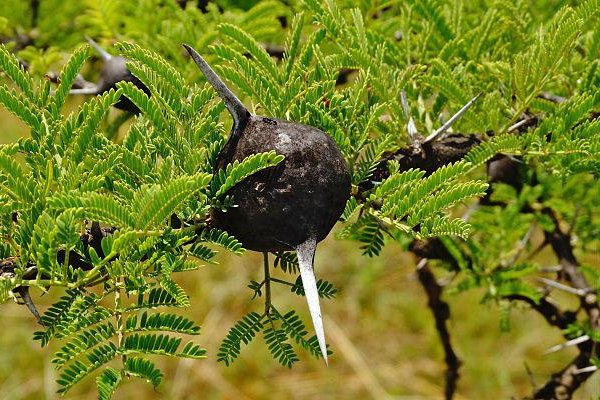Researchers have created a new antibiotic from bacteria found on a Kenyan plant-ant that shows promise in combating antibiotic resistance. Pictured, a Kenyan whistling thorn tree, where the ant species is found. Photo by Chr. Kooyman/
Wikimedia Commons
Feb. 15 (UPI) -- Researchers at the University of East Anglia in England have developed a new antibiotic from a bacterium found on a species of African ant that shows potential in fighting MRSA.
UEA scientists, along with researchers from the John Innes Center, have identified a new member of the Streptomyces bacteria family from the African fungus-growing plant-ant Tetraponera penzigi. The new bacterium was named Streptomyces formicae and the antibiotic is formicamycins.
"We have been exploring the chemical ecology of protective symbioses formed between antibiotic-producing bacteria and fungus-growing insects to better understand how these associations are formed and explore them as a new source of anti-infective drugs," Professor Matt Hutchings from UEA and co-author of the study, said in a press release.
"Kenyan plant-ants live in symbiosis with thorny acacia trees. They live and breed in domatia -- which are hollowed out structures which the plant evolved to house them -- and grow fungus in them for food. In return, they protect the plants from large herbivores including elephants, which won't eat plants covered in ants."
Researchers isolated several actinomycete bacterial strains from the acacia plant housing the ants and chose some for genome sequencing. One strain and the antibiotic compounds produced from it showed effectiveness in tests against other disease-causing bacteria.
"We tested formicamycins against clinical isolates of MRSA and vancomycin-resistant Enteroccocus faecium [VRE] and found that they are very potent inhibitors of these organisms," Hutchings said.
The tests were repeated growing the strains for 20 generations in very low, sub-inhibitory concentrations of formicamycins, and no sign was found that the test strains gained a higher level resistance to the new antibiotics.
"Our findings highlight the importance of searching as-yet under-explored environments, which, when combined with recent advances in genome sequencing and editing, enables the discovery of new species making natural product antibiotics which could prove invaluable in the fight against AMR," Professor Barrie Wilkinson of JIC and co-author of the study, said in a press release.
The study was published in Chemical Science.















